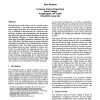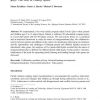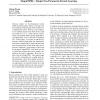853 search results - page 90 / 171 » Dyslexia and learning computer programming |
COMPUTER
2008
14 years 11 months ago
2008
Near-ubiquitous smart phones are the most promising heralds of future pervasive computing. However, despite their increasing capabilities in computation, communication, and sensin...
SIGCSE
2000
ACM
15 years 3 months ago
2000
ACM
Being exposed to well-written code is a valuable experience for students -- especially when the code is larger or more complex than they are currently capable of writing. In addit...
CSCL
2010
14 years 6 months ago
2010
We implemented a five-week family program called Family Quest where parents and children ages 9 to 13 played Quest Atlantis, a multiuser 3D educational computer game, at a local af...
104
Voted
ICML
2009
IEEE
15 years 12 months ago
2009
IEEE
Previous studies of Non-Parametric Kernel (NPK) learning usually reduce to solving some Semi-Definite Programming (SDP) problem by a standard SDP solver. However, time complexity ...
94
Voted
ML
2002
ACM
14 years 10 months ago
2002
ACM
We examine methods for constructing regression ensembles based on a linear program (LP). The ensemble regression function consists of linear combinations of base hypotheses generat...



